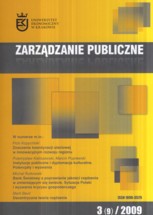Seven Theses on Sectoral Social Dialogue in Poland
Keywords:
social dialogue, employers organizations, trade unions, representativeness of dialogue partners, collective bargainingAbstract
The author considers the results of a study of development of sectoral social dialogue in Poland. He attempts to draw some conclusions from the rich and miscellaneous empirical data collected during the study. He discusses weak points of social dialogue in Poland (i.e. low representativeness of employer organizations and trade unions, focus on resolving ad-hoc problems); its opportunities, e.g. collective bargaining; and the best way, in the current circumstances, to develop social dialogue in Poland. The author states that the reported study shows the current conditions are characterized by pluralism. He concludes that the article is only an invitation to a debate on different variants of social dialogue in Poland.



